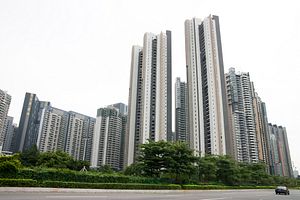China’s corporate bond market, which has yet to mature, is already facing a potential second default. Huatong Road and Bridge Group Company, a property builder, may default on a payment due on July 23. The first onshore bond default occurred earlier this year in March, when Shanghai Chaori Solar Energy Science and Technology Company defaulted on a coupon payment. The question is, will these defaults have a positive or negative impact on China’s corporate bond market?
First, by way of background: Huatong Road and Bridge Group Company blames the potential default on the investigation surrounding its chairman, Wang Guorui. The bond to be repaid has a coupon of 7.3 percent with no guarantees. The principal of 400 million RMB and interest of 292 million RMB ($47 million) are to be repaid tomorrow. Chaori Solar defaulted on an interest payment of 89.8 million RMB on March 7. Though the company had been performing poorly for some time, the market was surprised that the payment was allowed to default.
China’s corporate bond market is relatively underdeveloped. China’s overall corporate debt is higher than that in the United States, but only a relatively small proportion of this debt resides in corporate bonds. The ratio of corporate bonds to GDP in China is only 14 percent, which is below that of Singapore, at 31 percent, and Hong Kong, also at 31 percent. China’s corporate bond market is associated with insufficient market control: issuance of corporate bonds requires excessive administrative procedures, while bonds are subject to insufficient scrutiny by ratings agencies. This is evidenced by the fact that, while Chaori Solar’s credit rating was downgraded to CCC close to one year in advance of its default, Huatong Road’s rating agency underestimated the company’s creditworthiness until only recently when the company announced a potential default.
Compounding the problem, the current economic slowdown has reduced liquidity in the financial sector, making it more difficult to lend and borrow smoothly. When economic growth began to slow, the People’s Bank of China reduced the corporate yield spread to increase corporate borrowing. Additional yield over sovereign notes that AAA-rated companies pay to sell their bonds has declined since March 31, but it has recently widened again due to the potential Huatong Road default. In addition, weakness in the financial economy and bankruptcies of smaller firms continue to present a challenge to firms seeking to obtain loans.
How to interpret the corporate bond defaults is unclear. On the one hand, it is widely believed that corporate bond defaults discipline the market. However, the trend in defaults, with a second bond payment default coming soon after the first, may bode ill for the market’s wellbeing. The default of Chaori Solar was seen as gauging investors’ risk awareness in the corporate bond market. But a second corporate bond default just four months after the first may put investors off this still-nascent market.
While the National Development and Reform Commission stated after the default of Chaori Solar that there was no payment risk associated with corporate bonds issued under its approval, NDRC approval covers only enterprise bonds, or those linked to state-owned enterprises. This may leave non-state owned corporate bond holders out in the cold. The threat of payment defaults looms as many firms across China, particularly in the property sector, scramble to cover their debts.
To date, there have been few defaults on financial products such as wealth management and trust products, but markets remain jittery. News and rumors about flagging real asset prices and a liquidity crunch, particularly for smaller enterprises, leads one to question whether the potential default of Huatong Road’s corporate bond may over-amplify risk aversion among investors and frighten them away from the corporate bond market before it has truly gotten underway. In this climate of uncertainty, it sometimes seems that anything is possible.

































